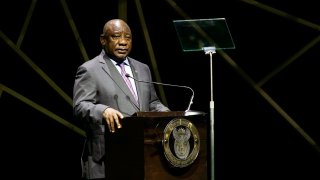Assessing South Africa’s New Government
South Africa’s recent elections have opened a narrow and perilous path toward reform and renewal.
South Africa is a country that manages to disappoint the optimists and confound the pessimists simultaneously. In the May 30 elections, the African National Congress (ANC), which came to power under Nelson Mandela in 1994 and won commanding majorities in each of South Africa’s five subsequent national elections, lost its electoral majority, falling to 40.1 percent of the vote.
In the aftermath, it rejected overtures from black nationalist parties to form what would have been a stridently anti-Western administration. Instead, it opted to enter into a government of national unity (GNU) with the centrist and pro-Western Democratic Alliance (DA) party. This result demands a careful balancing act from American policymakers who have been long frustrated with South Africa’s seemingly irrevocable slide into the orbit of anti-Western forces.
Much of the ANC’s defeat was accounted for by the rise of the Umkhonto we Sizwe Party (MKP) of the disgraced former ANC leader and president, Jacob Zuma. It won 14.2 percent of the vote, overwhelmingly in ethnic Zulu areas of the country. Amongst other things, its manifesto called for the dismantling of the constitutional order and property rights, mirroring the policies of an earlier ANC splinter, the Economic Freedom Fighters (EFF), that secured 9.5 percent of the vote.
On the other side of South Africa’s ideological divide, the centrist DA party, with its roots in South Africa’s white liberal opposition to apartheid, won 21.8 percent of the vote, drawing less than half of that from the country’s white minority. In crude terms, the ANC’s choice was between governing with South Africa’s “white party” or seeking to restore “black unity” through a reunification of the now fractured liberation movement.
That choice took place against the backdrop of acute American displeasure at South Africa’s foreign policy orientation. Indeed, elements within the previous ANC government appeared to be intentionally baiting Washington by hosting the Chinese and Russian navies for drills, allowing Iranian naval vessels to dock at the country’s ports, arming the Russian war effort in Ukraine, facilitating Iran’s admission to the BRICS, and fronting the “genocide” case against Israel at the International Court of Justice.
In response, American lawmakers have called for a review of the economic advantages South Africa draws from the Africa Growth and Opportunity Act and introduced legislation for the President to certify to Congress “whether South Africa has undermined U.S. national security or foreign policy interests.”
Concerns that the United States might finally lose patience and revoke South Africa’s preferential trade status led to a softening of South Africa’s stridently anti-Western rhetoric. Naledi Pandor, the foreign minister who had led the charge against Israel (and who visited Iran for a glad-handing diplomatic junket shortly after the October 7 attacks), failed to make the cut to return to parliament and is now out of cabinet.
In the short term, the main threat to South Africa’s renewed experiment in pragmatism comes from within the ANC itself. There is a powerful dissident faction within the party deeply opposed to the coalition deal. The expectation is that this grouping, together with the EFF and MKP, will pursue a strategy of racial nationalist radicalization to build a groundswell of sentiment against the pro-Ramaphosa leadership within the ANC in an effort to topple both it and the GNU.
Given the prospect of the GNU repairing South Africa’s damaged relations with Western democracies, both Russia and China may be tempted to support this strategy.
The external threats do not simply come from these quarters, however. The minimum the new government needs to do to ensure its legitimacy is to avoid a renewal of the rolling electricity blackouts that crippled South Africa’s economic growth rate and thereby fatally damaged public confidence in the previous ANC government.
Ensuring an electricity supply sufficient to allow industrial investment to cut the staggering 32.9 percent unemployment rate requires restoring the country’s existing fleet of coal-powered power stations to proper working order. Yet there is considerable pressure from Western governments and NGOs to stop this and instead push South Africa into an unrealistic and headlong transition to renewable energy that, for one thing, the country’s existing grid is not able to accommodate.
Meanwhile, the racial nationalist agitation of the EFF and MK acquires much of its intellectual force and legitimacy (it claims to be “anti-racist”) from ideological currents in the West (and not from Russia or China).
Intense domestic and international pressure has opened a narrow and perilous path toward reform and renewal for South Africa. The balancing act for American lawmakers will be not to let up the pressure until foreign policy reform is evident while at the same time holding back the influence of those Western intelligentsia, activists, and diplomats whose climate policies and divisive ideologies risk pushing the new GNU over the edge.
Dr. James Myburgh directs the Europe-based BRE-DE-RE Initiative, which identifies and counters threats to liberty in democratic societies.
Dr. Frans Cronje chairs South Africa’s Social Research Foundation as well as BRE-DE-RE’s advisory board.
Image: Sunshine Seeds / Shutterstock.com.

